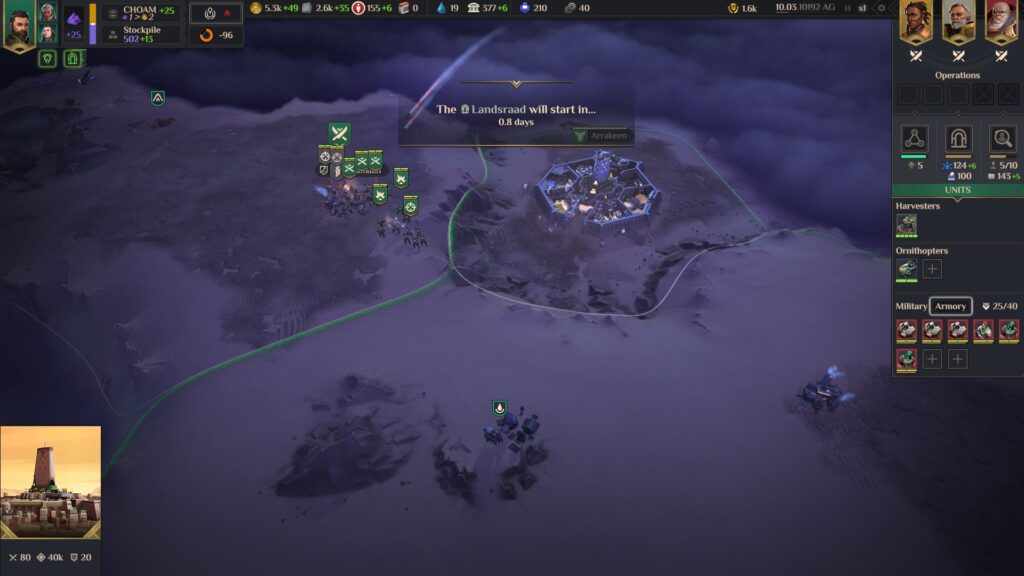In Frank Herbert’s Dune, control over the known universe is finely balanced between three interdependent bases of power.
First, the imperial power of House Corrino, backed by the Emperor’s deadly military force, the Sardaukar. Second, the Spacing Guild, whose monopoly on interstellar travel is ensured by their unique precognitive navigators, the only ones capable of traversing folded space.
Finally, we have the Landsraad, a council of the great noble houses designed to place checks and balances on the Emperor’s authority. Central to the idea of the Landsraad is that when united the great houses are a force equal to that of the Emperor.
House rules

In Herbert’s Dune, the Landsraad is a one-stop shop for the houses to negotiate alliances and trade agreements, resolve disputes, formalize feuds and vendettas through the practice of kanly, and discipline any breach of the Great Convention’s ban on the use of atomic weapons against humans. It’s the realm of politics, where the balance of power shifts with every bargain struck and accord broken.
And so it is in Dune: Spice Wars, where the Landsraad system allows players to spend their political influence to pass policy charters that affect each faction. Charters can target specific factions, such as introducing a resolution that decreases the power of a faction’s military units. They can also be applied globally, with an Arrakis-wide tax on water payable by all factions, for example.
Voting on a fixed cycle

With December 2023’s community update to Dune: Spice Wars, the Landsraad has undergone several significant changes, but its core purpose remains intact: to shift the balance of power in the player’s favor.
The most obvious change is that the Landsraad vote now happens on a fixed cycle. Previously it was possible to overlook a notification and miss entire voting opportunities. Now, the game will pause every 20 days to allow for the Landsraad vote to take place, giving plenty of time—in single-player—to properly weigh up one’s options. In multiplayer games, the action will pause for a certain amount of time, determined in the pre-game lobby, while players cast their votes.
The benefits here go beyond unmissable Landsraad votes. The revised focus on a 20-day cycle adds to the strategy, as there’s no chance to pass a new resolution before the next vote if things take a turn for the worse.
Charters more likely to pass the vote
Another notable change affects charters. Previously, it was possible to decline and not enact a charter, even if its conditions were met. Now, assuming two or more factions meet the prerequisites, the charter will always pass the Landsraad vote.
Charters can target specific factions, such as introducing a resolution that decreases the power of a faction’s military units.
The Landsraad standing of a house determines which charters can be enacted each session, up to and including the Landsraad standing threshold required to introduce the Governorship vote that, if successful, can trigger a political victory.
Making friends and influencing people
Standing also affects a faction’s influence both at the Landsraad and in the wider economic sphere. A low standing brings several penalties, including fewer votes, decreased influence and a less favorable exchange rate on the CHOAM spice market.
Conversely, a high standing increases available votes and Influence, gives a favorable spice exchange rate, and adds to the faction’s crucial Hegemony score.
Fixing the vote
Most factions have their own way of manipulating the Landsraad vote. House Atreides can ignore charter prerequisites if its Hegemony is high enough. The Smugglers can bribe the minor houses, whose votes are otherwise at the mercy of RNG.
House Corrino can alter the scope of a charter to force it to apply to one faction, or globally, while the Ecaz can declare immunity from a charter’s effects.
Meanwhile, the Fremen and Harkonnen can gain retribution against a faction for successfully passing a resolution. The Fremen can cause rebellions inside the territory of the new charter owner, and the Harkonnen can apply corruption to reduce the Landsraad standing of the winning faction.
The Landsraad is, of course, key to a Political Victory.
Deft politicking at this point can help swing a vote in your favor or punish enemies.
The Landsraad is, of course, key to a Political Victory. It shouldn’t be ignored when pursuing other goals, though. Many of the resolutions that can be passed through the Landsraad can benefit a Domination or Hegemony Victory.
By pausing the game and making sure players can’t miss it, the 20-day cycle helps all players exploit the Landsraad to its fullest–not just those who remember to check.
Dune: Spice Wars is made by Shiro Games and published by Funcom.

